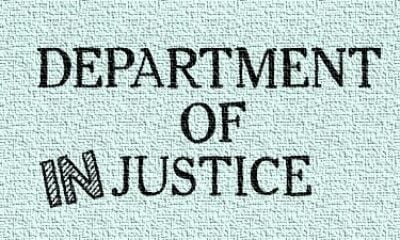

Society & Culture
Human Beings: Earth’s Imperfect Caretakers
Since the dawn of civilization, no society has fully grasped what is necessary to live in harmony with its environment
Before human occupation, forests, not deserts and barren plain, covered the uplands of Arizona and New Mexico. The mighty Mayan civilization, with a population of 200,000 in what is now Mexico and Central America, fell into ruin following human-caused depletion of the rain forests, heavy soil erosion, and internal warfare — 700 years before Columbus’ arrival in the Western Hemisphere.
Misinformation about how societies developed and how their people lived often leads to erroneous conclusions about how present-day society ought to be managed. Accordingly, what we understand to be historical realities are often distortions of the truth.
Misinformation Abounds
Predictably, the volume of contradictory information and the associated discrepancies it spawns is rising. Annually, well over 40,000 scientific journals publish more than a million new articles.
“The number of scientific articles and journals published worldwide is starting to confuse researchers, overwhelm the quality-control systems of science, encourage fraud, and distort the dissemination of important findings,” says New York Times science journalist William J. Broad.
Misinformation has become a major impediment to social progress. In these “politically correct” times, in the area of social history in particular, too often pseudo-historians dispense misinformation in the form of “feel-good history,” a term referred to by noted professor and distinguished historian Dr. Arthur Schlesinger, Jr., in his award-winning book, The Disuniting of America.
Feel-good history is “history” designed to accent or embellish the accomplishments or nature of select groups for purposes other than conveying what historical records objectively reveal. Such accounts cloud the accuracy of historical accounts, presenting events in ways that might not be real or complete depictions of what took place.
American history, as a case in point, has become one of the most maligned of the historical disciplines. To be sure, the U.S. government reneged on treaties and, sometimes inadvertently, sometimes not, destroyed cultures.
Nonetheless, do misinformed or overzealous teachers and leftist professors have the right to overturn decades of research and analysis in their efforts to present “the untold, untaught side of American history?”
Are they justified in making wholly unfounded assertions about the origins, nature, and achievements of ethnic groups that they represent or who they feel have been slighted by “Eurocentric” versions of history?
Erroneous Beliefs
Consider common beliefs about Native American populations. Evidence is mounting that Europeans pre-dated them in North America, but that is the subject of a different article. Many people today believe that the arrival of Europeans from 1492 was co-terminus with the introduction of disease to native populations.
Europeans did bring with them new diseases, such as smallpox, which proved to be more deadly to North American peoples than it was to Europeans, but by no means were Native Americans free of disease beforehand.
Karl Reinhard, Ph.D., a prominent pathologist, observed that “Native Americans had already accumulated quite a spectrum of parasitic diseases before the Europeans arrived. Take the Incas. We’re looking at no less than three species of lice, not to mention different varieties of fleas, tapeworms, hookworms, the works.”
Actually, all told, American civilization, with all its strengths and weaknesses, is as good and decent a society. Many Americans, however, believe that Native American cultures historically were superior in interacting with one another and in maintaining a harmonious balance with the environment. This view is naive at best and classically demonstrative of the perils of misinformation.
Environmental Novices
Archeologists find that since the dawn of civilization, no society has fully grasped what is necessary to live in harmony with its environment and for its people to live in peace with one another.
In the last 10,000 years of civilization, for example, remarkably little has changed in the way in which people treat their surroundings. Dr. William K. Tabb, one of my economics professors in college, remarked to our class that economics in essence was the “allocation of scarce resources.” Only when a society has to manage limited resources is it an “economic” society.
Let’s apply this to the case at hand. Some Native American nations starved during harsh winters. Some could not care for all their members. On a continent as large as North America, most Native American nations were blessed with vast stretches of land, often more than they could use.
In that sense they were not “economic” societies. In comparison to today, natural resources were plentiful. Because they did not live in economic societies, it is hard to determine to what degree many Native American nations practiced sound environmental policy.
Vast Stretches
Vast sections of the southwestern United States, for example, were completely decimated by over-cutting. Dr. Charles Redman, an anthropologist at Arizona State University, says, “The idea of the primordial paradise, that pre-European societies were somehow great environmentalists, is romantic history.”
The cliff-dwellers, with their elaborate wooden structures, likely sealed the ecological fate of their region for evermore. In the Eastern U.S., the Cherokee removed such large swaths of forest along riverbanks — not coincidentally, some of the areas now most carefully protected by environmental legislation — that Europeans entering some areas thought there were no trees.
Illness and injury were treated with natural remedies, many of which worked and are still viable solutions for health problems today. It would be unwise, however, to surmise that all Native American nations at all times were populated by wise dispensers of health information that uniformly fortified their people.
For acute illnesses, major injury, and rare disorders, most nations could do little for the afflicted and, if they sought to do anything, would do more harm than good. Operations were crude. Medical hygiene was all but unknown. Many “treatments” hastened the death of the patient rather than alleviating the condition.
Human Rights or Tribal Mythology?
Many contemporary Americans believe that Native American nations were exemplary in their homage to human rights. This issue cannot be summarily concluded. Some groups were effective in upholding human rights; some were not.
Many people within nations paid homage to human and individual rights; many people did not. In some nations, elders were cast out of the tribe to die on their own once it was believed that their final days were near.
Some nations, and many individuals within many nations, were intolerant of homosexual behavior or other sexual and personal orientations that deviated from the norm. Many nations maintained rituals and customs that forced individuals into predetermined roles independent of their individual aspirations or aptitudes.
As cited previously, some nations maintained elaborate rituals and rites of passage whereby young men were summarily cast into battle. Or, young men had to fight and kill a wild animal, perhaps with nothing more than a knife or a spear. They then would have to return with the animal’s vital organs to prove their “manhood.”
Paradise, Not
In many nations, everyone was expected to pull his own weight-not necessarily a bad idea, as societies go-but what fate befell those who proved to be less physically endowed?
Some nations permitted polygamy, whereby one man was permitted many wives, usually with no say on the part of the maidens thrust into service. Still, many Native Americans loved the earth, lived in harmony with it, and lived in harmony with each other. Their poetry and chants often reveal the kinship they felt with the earth.
Let us avoid the trap, however, of sanctifying those who were here before us because some of them, in some respects, embodied environmentally and socially redeeming virtues needed today.
Let’s not paint in our minds and post in our literature exalted, vague notions of environmentally and morally superior peoples whose ageless wisdom is somehow quintessential to our survival today.
Learning From Our Past
The lesser-known side of Native American history is one example of how history can be skewed to reflect a certain set of ideas. There are, of course, other examples throughout world history.
It’s vital that we draw what we can from the knowledge of such cultures and be respectful of their heritage. Let’s forsake the counterproductive mythology that seeks to rewrite history to match the flawed ideology of a few.
Instead, let’s learn what we can from the actual lessons and experiences of history, and use that knowledge to improve as a society.
– – – – –
We'd love to hear your thoughts about this article. Please take a minute to share them in the comment section by clicking here. Or carry the conversation over on your favorite social network by clicking one of the share buttons below.
Join the conversation!
We have no tolerance for comments containing violence, racism, profanity, vulgarity, doxing, or discourteous behavior. Thank you for partnering with us to maintain fruitful conversation.
Guns
Prepare for the Worst: Domestic Sabotage and Violence on the Horizon
The wheels of extremism are already in motion
Leading up to this November, and beyond, it now seems inevitable that America will experience extreme turmoil, if not outright hostilities and even urban warfare. Nothing that I write here will have any impact in terms of what is likely to occur. For one, Leftists don’t tend to read articles by conservative and, two, the wheels of extremism are already in motion.
Tactics Without End
I devote at least 500 hours annually to reading about political, historical, and cultural matters, adding up to more than 5,000 hours in the last 10 years. I’ve reached the same conclusion which legions of others have: Domestically the U.S. is headed for huge trouble. We already know many of the Left’s tactics to hinder Donald Trump’s 2024 campaign, which include devious hoaxes, endless lies and slander, bogus lawsuits and selective prosecution, unconstitutional fines, and much more.
As spring leads to summer, Trump’s lead over Biden could grow. As such, expect the Left to act even more desperately with reprehensible tactics. Consider that of late RINO Congressional Representatives are suspiciously retiring early on dates with no chance for a special election to occur in their districts. Hence, Democrats can retake the House. Do you smell payola? Thereafter if Trump is elected, the House could attempt to deny certification.
By June or July, invariably, the Left will seek to foment another “George Floyd” incident and blame it all on Trump. With the power of The New York Times and major networks embellishing the narrative and offering World War II level coverage, the masses will be snowed. Think about Donald Trump observing that if he’s not elected there will be a bloodbath in the auto industry, and how the mainstream media, in unison, immediately claimed that Trump was calling for nationwide violence.
The Left is Violent and Everyone Knows It
The most violent segment of our society happens to be on the Left, as even many casual observers know. If Trump is ahead in the polls in September or October, expect dissension wherever the Left can prevail. When Trump wins the election in November, expect riots in 200 cities or more, surreptitiously funded by George Soros and his kind.
The money will fuel Antifa and other groups of young men and women who do not have career level jobs but do have questionable futures. The riots will last for as long as the extremists can persist; days, weeks, even months. From there, open warfare, in the form of urban snipers, is entirely possible.
Leading up to inauguration on January 20, many key dates such as certification from Congress, approval of Electoral College votes, and so on, represent key opportunities for the Left’s planned disruptions.
Disruption and Sabotage
January 20 could be a day of extreme violence. Washington, DC will have to be put under martial law. National guards from every surrounding state will be employed. The violent Left will not allow Trump to peacefully take over the reins from the corrupt, demented Joe Biden.
Biden’s administration, ruled by Barack Obama, will not offer a smooth transition of power, unlike all other presidents since our nation was founded. This is except for Obama, who did all he could to sabotage first Trump’s administration from the get-go.
The rest of January leading into February will represent days of turmoil. The Left will attempt to disrupt Trump’s second administration 24/7. They will harass and threaten political appointees. They will form roadblocks. They will resort to antics in front of federal buildings, the Supreme Court building, and other targeted locations which they deem to be ‘in their way.’
Eventually, Trump can clean it all up but at enormous financial and social cost. Rioters and less-than-peaceful protestors can be taken off the streets and, this time, held for much more than 24 hours. They can be charged, fingerprinted, photographed, and processed by a now lawful Department of Justice . However, such major operations will result in a lot of pain and gnashing of teeth.
Sadly for our nation, the scenarios above are more likely to be true than not.
– – – – –
Life
With Representatives Like Kelly Daughtry, We Can Take Back America
Daughtry is a soft-spoken woman who gets things done
When President Trump takes office next January 20th, he’s going to need a cadre of strong-willed Congressional representatives. It’s not enough to simply retake the White House, we need the foot soldiers with the unshakeable resolve to restore America.
In North Carolina’s 13th district, one candidate is firmly rooted in the values that made this country great, and will make it great again. Her name is Kelly Daughtry and, quite frankly, the nation needs many others like her.
Raised in rural North Carolina and the daughter of a U.S. veteran, farmer, lawyer, and entrepreneur, Daughtry has been a practicing lawyer for the past 25 years in Johnston County, where she makes her home. She’s been in the trenches and is not skittish about the slings and arrows that come with taking bold, conservative positions for what is right.
Clear Positions on Vital Issues
Daughtry is exceedingly clear on where she stands and on what will improve the lives of American citizens. She is a vigorous supporter of law enforcement and decries ‘de-fund the police’ movements wherever they arise. She understands that, by and large, the men and women in law enforcement are dedicated, hardworking individuals who, in many instances, put their lives on the line.
Similarly, Daughtry supports the U.S. military and our veterans. She knows that nations around the world with rogue leadership wish to do us great harm, and that we must maintain a strong military at all times. Not coincidentally, a strong military is the best prescription for peace.
On the border issue, Daughtry recognizes that the Biden Administration is firmly committed to swamping our country with illegal aliens. Why? Because the U.S. Census count doesn’t focus on U.S. citizenship, only the number of residents per county and state.
Hence, Democrats can gain a 20-seat advantage in the U.S. House of Representatives by continuing to flood our nation. This ploy is precisely why Biden and company have brought lawsuits against border states seeking to protect themselves.
The drugs, the crime — the murders — and the bursting budgets of towns and states trying to cope with the onslaught of illegals should never have happened in the first place. Daughtry knows what needs to be done, and done immediately.
Reversing Biden’s Reckless Agenda
Daughtry will go to work on restoring our nation, dismantling Joe Biden’s reckless agenda for America. She understands that Biden’s policies towards China in particular, and the bribes he has taken, have been nothing less than devastating for hard-working Americans and for our national security.
Most notably, she is firmly opposed to the Chinese Communist Party and their representatives who are seeking to buy farmland throughout North Carolina as well as every other place in the United States.
Biden’s out-of-control spending has particularly hurt North Carolinians. Farmers have taken the brunt of the punishment. The unending inflation that we’ve faced for 38 months also has dealt a crushing blow to North Carolina small business owners and families in general. One of Daughtry’s first agenda items will be to help steer our country back towards fiscal sanity, which in turn will have a direct impact on the cost of groceries and gasoline.
Americans First
Like President Trump, Daughtry understands the importance of putting Americans first and of safeguarding or voting procedures, elections, and indeed what it means to be an American citizen. Of note, she has no misconceptions about the differences between men and women and will work to stop the malarkey that the Left imposes on us every day, with their “56” types of genders.
Daughtry is a soft-spoken woman and in her quiet way, gets things done. If Donald Trump had an army of Kelly Daughtrys, the country would be on firm footing in relatively short order. She knows what hard-working Americans want and need, and is exactly the type of politician that North Carolina must send to Washington D.C.
It is not an exaggeration to say that in Wake, Harnett, Johnson, and Wayne counties in North Carolina, as well as the entire state and entire country, the 2024 election will be the most important in our lifetimes. This has been said about other elections at other times, but considering the damage that the Democrats have wrought on America, the time is now to reclaim our great nation and, with the likes of Kelly Daughtry, we can.
– – – – –












